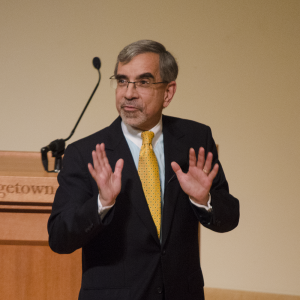
MSFS Director Anthony Clark Arend (SFS ’80) spoke about human dignity in the Lohrfink Auditorium on Thursday.
Contributors to the new book “Human Dignity and the Future of Global Institutions” discussed the role of human dignity in a changing international environment filled with a proliferation of new international actors in a panel hosted by the masters of science in foreign service program, the Mortara Center for International Studies and the Berkley Center for Religion, Peace, and World Affairs in the Lohrfink Auditorium on Thursday evening.
“The one thing that we have seen in the international system is a change, a proliferation in the international actors. Clearly states still exist in the international system but we have seen a proliferation of intergovernmental organizations, nongovernmental organizations [and] substate actors,” co-editor and MSFS director Anthony Clark Arend (SFS ’80) said.
According to the book, this changing international environment should be addressed by a focus on human dignity.
“The fundamental thesis of the book is that human dignity should serve as the guiding principle for all these institutions. It should serve as the touchstone as these institutions, as varied as they may be, try to carry on their work,” Arend said.
According to Arend, the key to a new emphasis in human dignity is starting up a conversation.
“We then end the book with a plea. The plea is to take this concept of human dignity, to take this book as a starting point, to seek to promote what we call a dignitarian dialogue,” Arend.
The authors said that it is difficult to sustain reform for human dignity and rights’ issues because of disagreements about implementations, not because of a lack of a consensus on the general ideas.
“What we recognized in a sense is that it has always been easier to get countries, organizations, groups to agree to concepts than it has been to get enforcement. After all, no one wants to have to answer positively to the question, have you stopped beating your wife yet?” SFS professor Ambassador Don McHenry, the former U.S. Permanent Representative to the United Nations from 1979 to 1981, said.
McHenry recognized that this issue is at the center of the book.
“The writers have sought to wrestle with not just the concepts of human rights and human dignity, not just the way in which we can get people on the same label in terms of what we are talking about, but they have sought to wrestle with the implementation and the problems which arise,” McHenry said.
The panel also discussed the role of the United States in shaping the conversation regarding human dignity.
“It is too coy to suggest that the United States should stand back and not be a vigorous promoter of human dignity. It shouldn’t take over the dialogue but as there will be suspicion that human dignity is somehow a Trojan horse for the U.S. ways of doing things, it should be a cultivator, not a hegemonic player,” said co-editor Ambassador Mark Lagon, the chair for global politics and security and professor in the practice of international affairs.
The authors said that they chose to speak more about human dignity rather than human rights because of the fundamental cross-culture concept of human dignity.














